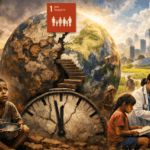All of a sudden, Taliban have erased women’s voices from Afghanistan’s universities, banning books authored by women, marking the latest effort to suppress female voices in education. This move is a part of a wider directive issued in late August, which also targets courses on human rights, sexual harassment, and women-focused subjects, including Gender and Development and Women’s Sociology.
According to Afghan officials, 140 books published by women are among 680 titles classified as “of concern” for allegedly breaking Sharia and Taliban policy. Universities have been advised that 18 disciplines are now off-limits, six of which are especially focused on women.
Zakia Adeli, the former deputy minister of justice before the Taliban returned in 2021, found the latest restriction as unsurprising due to the group’s history of restricting women’s basic rights such as prohibiting girls from attending school after sixth grade and closing midwifery schools in late 2024. “When women themselves are not allowed to study, their views, ideas, and writings are naturally suppressed.” said Zakia.
However, the boycott also affects Iranian authors and publishers. Among the 679 titles on the 50-page prohibited list, 310 were either written by Iranian authors or published in Iran. Taliban officials stated that the decision was made to prevent the “infiltration of Iranian content” in Afghan higher education.
Of course, every action comes with a consequence and for Afghan universities things have become quite serious. Professors describe having difficulty filling up the voids created by eliminated material.
Books by Iranian authors and translators are the principal link between Afghanistan’s universities and the international intellectual community. “Their removal leaves a significant void in higher education,” said one faculty member. In many cases, lecturers are forced to draft textbook chapters themselves, adhering to Taliban restrictions, often raising questions about whether such material can meet global academic standards.
Beyond the classroom, this ban represents a larger attempt to regulate information and limit women’s power in society. Courses on sexual harassment and human rights are being discontinued at a time when international observers warn that Afghan women are still extremely vulnerable. Meanwhile, the Taliban strongly believe that the regulations would definitely align with their understanding of Islamic law and Afghan culture.
Critics believe that the bans deepen the educational problem and isolate Afghanistan from the international academic community. With limited access to competent resources and an increasingly censored curriculum, students would confront major barriers to higher education, particularly women, whose participation in education has gradually decreased ovehttps














